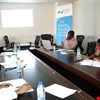
/ Central Africa
GWP-CAf Supporting Six Countries in the SDG 6.5.1 Monitoring Process
Mindful of the SDG 6.5.1 reporting deadline of July 31st, GWP-CAf and its five CWPs have been fully engaged with country focal points to ensure that the ongoing monitoring and reporting process is conducted as per the UNEP guidelines.
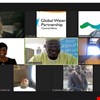
/ Central Africa
GWP-Cmr hosts the 13th Session of its Steering Committee Meeting
Global Water Partnership Cameroon (GWP-Cmr) held the 13th and first ever virtual session of its Steering Committee meeting on July 3rd , 2020.
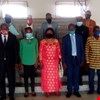
/ Central Africa
GWP Congo facilitates the validation workshop for the National Report on SDG 6.5.2 for the Republic of Congo.
Hosted by the Ministry of Energy and Hydraulics for the Republic of Congo (MEH) and facilitated by Country Water Partnership Congo and the UNESCO International Hydrological Programme (IHP Congo), the validation workshop for the national report on SDG 6.5.2 for the country took place in Brazzaville, Congo on the 22nd of June, 2020. The workshop had as objective to discuss on the state of Congo's water resources and cooperation in the field of transboundary waters and validate the draft report on SDG indicator 6.5.2, which assesses cooperation on transboundary rivers, lake basins and transboundary aquifers.
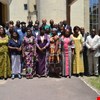
/ Central Africa
CWP Republic of Congo (CWP-Congo) Now Accredited
The Republic of Congo Country Water Partnership (CWP Congo) has been accredited by the Executive Secretary of Global Water Partnership, Monika Weber-Fahr. The accreditation letter which was signed on June 12, 2020 makes CWP Congo the 4th CWP to be accredited within the GWP-CAf Network.
/ Central Africa
Central African Republic CWP signs a Memorandum of Understanding with the Ministry in Charge of Water, CAR
The Central African Republic country water partnership (CWP-CAR) has signed a Memorandum of Understanding (MoU) with the country’s Ministry in Charge of Water to facilitate collaboration between the two parties, to jointly promote the development and management of water resources through planning for and implementation of IWRM in the country.
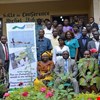
/ Central Africa
New President for the Technical and Scientific Committee of CWP-Central Africa Republic (PNE-RCA)
The Central Africa Republic Country Water Partnership (CWP Central Africa Republic) has designated a new Chair for its Technical and Scientific Committee.
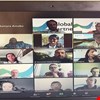
GWP-CAf takes part in the First Global Water Partnership Virtual Regional Days 2020
Every year, all GWP Regions meet to brainstorm, share knowledge and learn about current challenges and future opportunities for the network at the annual regional days. Due to the COVID-19 crisis, this year’s regional days was held virtually for a period of four days, starting June 1st with over 100 participants at the opening plenary chaired by the outgoing Executive Secretary (ES), Monika Weber-Fahr . All regions were fully represented including GWP-CAf which was represented by the Regional Chair, Regional coordinator, as well as the Finance and Communications officers.

/ Central Africa
GWP Cameroon changes status from an Association to a Non-Governmental Organization
After almost five years since the initiation of the administrative process to change its legal status, Country Water Partnership, Cameroon (GWP-Cmr) is now an NGO following a Ministerial Decree n° 00000005 of April 1st 2020. This change in status brings along a number of advantages the possibility to seek direct funding from government ministries and related organizations in order to advance its mission of ensuring water security in Cameroon. In an interview with the Chair of GWP-Cmr, Mr. Mamoudou Ousman talks about GWP- Cmr, what prompted the need for a legal status change, benefits and challenges, and shares lessons learnt with other Country Water Partnerships (CWPs) in the GWP-CAF network looking to change their legal status.
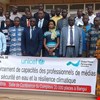
/ Central Africa
GWP trains over thirty journalists in the Central African Republic on water security, climate resilience, and the role of the media in IWRM communications
To strengthen journalists understanding of water security and climate resilience for effective communication with stakeholders, the Central Africa Republic Country Water Partnership (PNE-RCA), with the technical and financial support of the GWP Central Africa (GWP-CAF) and UNICEF, organized a two day capacity building workshop for media professionals in Bangui in December 2019. The participants at the workshop expressed their gratitude for the initiative and committed to contribute to the sensitization of stakeholders on water security and climate resilience. They also made a series of recommendations to key stakeholders, on enhancing water security and climate resilience. Steps have since been taken by PNE-RCA to implement the recommendations made towards the establishment of a network of water and climate journalists, and plans have been made to sustain it through subsequent capacity building workshops.
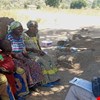
/ Central Africa
GWP Cameroon: Women at Center of Raising Awareness and Changing Mentality on Dental Fluorosis
GWP Cameroon and its partners have trained women leaders in the Meri District, Northern Cameroon on community sensitization on fluorosis and its health impacts. The aim was to help change mentalities and break stereotypes related to dental fluorosis. An evaluation shows that the training and the activities of the women leaders has had a positive impact on the community's perception of the disease. The approach also created momentum for awareness activities in the entire Mayo Tsanaga River Basin.